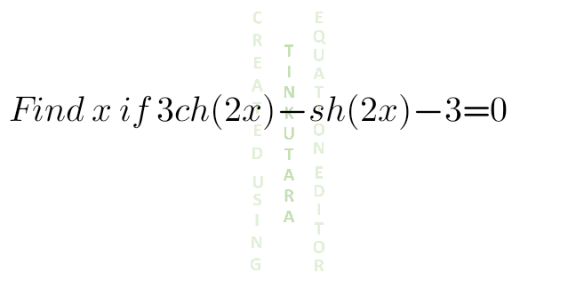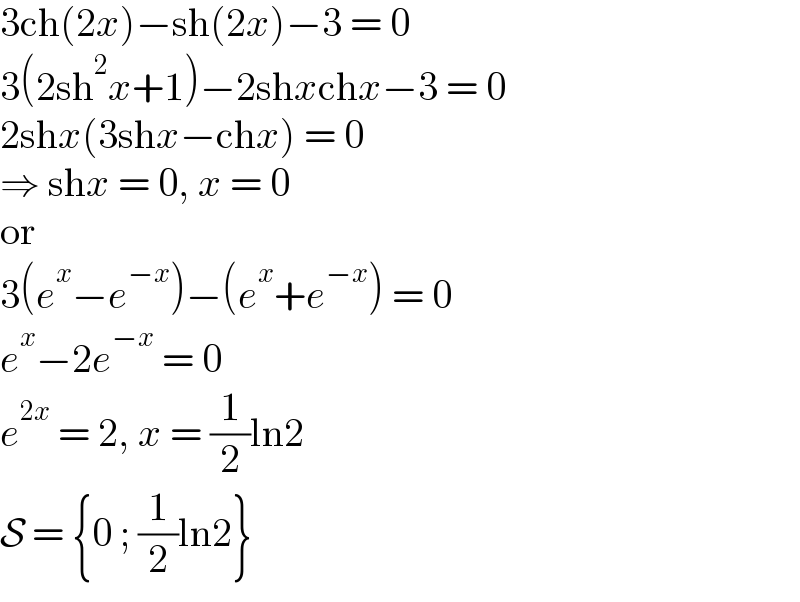Question Number 130802 by shaker last updated on 29/Jan/21

Answered by TheSupreme last updated on 29/Jan/21

$${Assuming}\:{ch}={cosh} \\ $$$$\mathrm{3}{cosh}\left(\mathrm{2}{x}\right)−{sinh}\left(\mathrm{2}{x}\right)−\mathrm{3}=\mathrm{0} \\ $$$$\mathrm{3}\left(\frac{{e}^{\mathrm{2}{x}} +{e}^{−\mathrm{2}{x}} }{\mathrm{2}}\right)−\frac{{e}^{\mathrm{2}{x}} −{e}^{−\mathrm{2}{x}} }{\mathrm{2}}=\mathrm{3} \\ $$$${e}^{\mathrm{2}{x}} +\mathrm{2}{e}^{−\mathrm{2}{x}} −\mathrm{3}=\mathrm{0} \\ $$$${e}^{\mathrm{4}{x}} −\mathrm{3}{e}^{\mathrm{2}{x}} +\mathrm{2}=\mathrm{0} \\ $$$${e}^{\mathrm{2}{x}} ={t} \\ $$$${t}^{\mathrm{2}} −\mathrm{3}{t}+\mathrm{2}=\mathrm{0} \\ $$$$\left({t}−\mathrm{1}\right)\left({t}−\mathrm{2}\right)=\mathrm{0} \\ $$$${e}^{\mathrm{2}{x}} =\mathrm{1}\rightarrow{x}=\mathrm{0} \\ $$$${e}^{\mathrm{2}{x}} =\mathrm{2}\rightarrow{x}=\frac{\mathrm{1}}{\mathrm{2}}\mathrm{ln}\left(\mathrm{2}\right) \\ $$
Answered by Olaf last updated on 29/Jan/21

$$\mathrm{3ch}\left(\mathrm{2}{x}\right)−\mathrm{sh}\left(\mathrm{2}{x}\right)−\mathrm{3}\:=\:\mathrm{0} \\ $$$$\mathrm{3}\left(\mathrm{2sh}^{\mathrm{2}} {x}+\mathrm{1}\right)−\mathrm{2sh}{x}\mathrm{ch}{x}−\mathrm{3}\:=\:\mathrm{0} \\ $$$$\mathrm{2sh}{x}\left(\mathrm{3sh}{x}−\mathrm{ch}{x}\right)\:=\:\mathrm{0} \\ $$$$\Rightarrow\:\mathrm{sh}{x}\:=\:\mathrm{0},\:{x}\:=\:\mathrm{0} \\ $$$$\mathrm{or} \\ $$$$\mathrm{3}\left({e}^{{x}} −{e}^{−{x}} \right)−\left({e}^{{x}} +{e}^{−{x}} \right)\:=\:\mathrm{0} \\ $$$${e}^{{x}} −\mathrm{2}{e}^{−{x}} \:=\:\mathrm{0} \\ $$$${e}^{\mathrm{2}{x}} \:=\:\mathrm{2},\:{x}\:=\:\frac{\mathrm{1}}{\mathrm{2}}\mathrm{ln2} \\ $$$$\mathcal{S}\:=\:\left\{\mathrm{0}\:;\:\frac{\mathrm{1}}{\mathrm{2}}\mathrm{ln2}\right\} \\ $$
